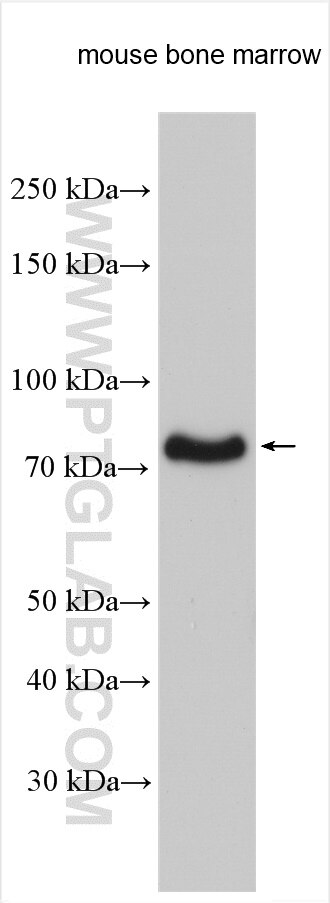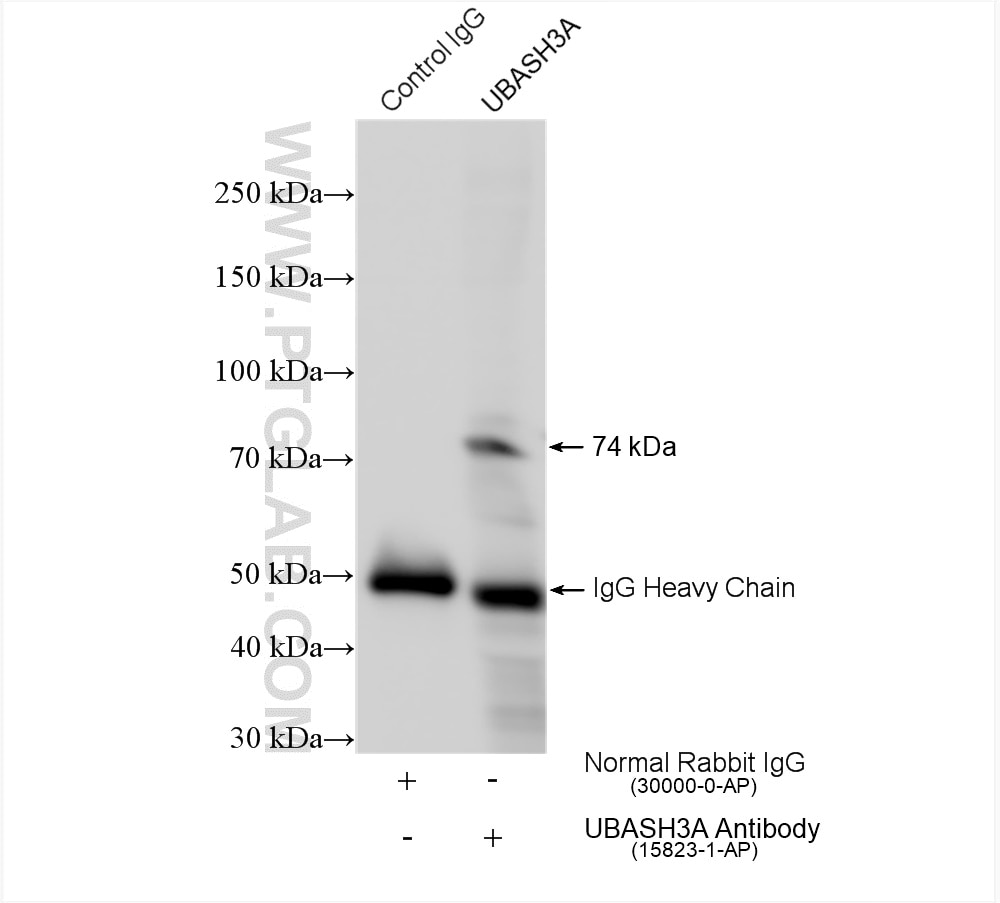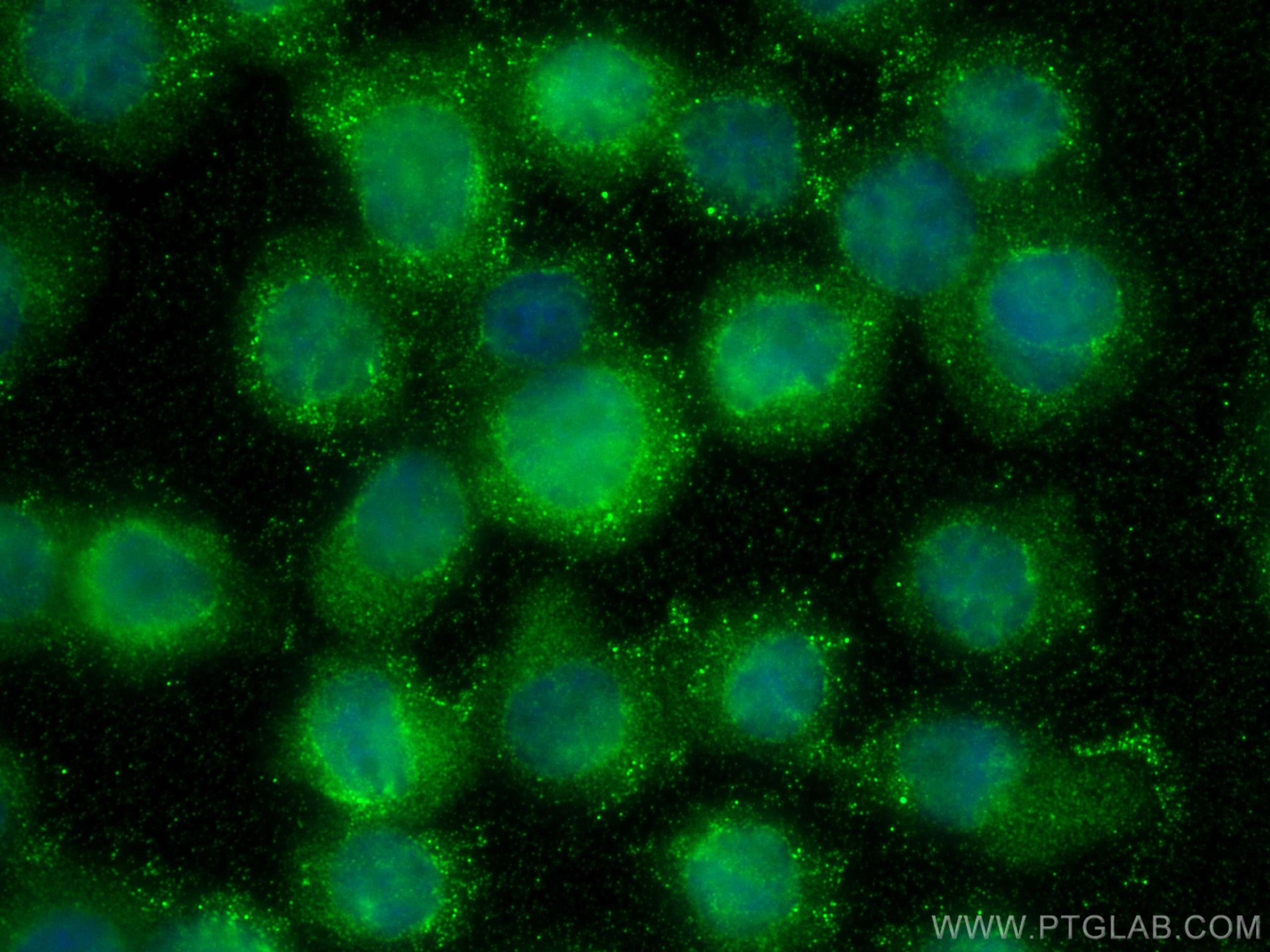Validation Data Gallery
Tested Applications
| Positive WB detected in | mouse bone marrow |
| Positive IP detected in | mouse spleen tissue |
| Positive IF/ICC detected in | THP-1 cells |
Recommended dilution
| Application | Dilution |
|---|---|
| Western Blot (WB) | WB : 1:1000-1:8000 |
| Immunoprecipitation (IP) | IP : 0.5-4.0 ug for 1.0-3.0 mg of total protein lysate |
| Immunofluorescence (IF)/ICC | IF/ICC : 1:200-1:800 |
| It is recommended that this reagent should be titrated in each testing system to obtain optimal results. | |
| Sample-dependent, Check data in validation data gallery. | |
Published Applications
| WB | See 7 publications below |
Product Information
15823-1-AP targets UBASH3A-Specific in WB, IF/ICC, IP, ELISA applications and shows reactivity with human, mouse, rat samples.
| Tested Reactivity | human, mouse, rat |
| Cited Reactivity | human, mouse |
| Host / Isotype | Rabbit / IgG |
| Class | Polyclonal |
| Type | Antibody |
| Immunogen |
Peptide 相同性解析による交差性が予測される生物種 |
| Full Name | ubiquitin associated and SH3 domain containing, A |
| Calculated molecular weight | 74 kDa |
| Observed molecular weight | 70-74 kDa |
| GenBank accession number | NM_018961 |
| Gene Symbol | UBASH3A |
| Gene ID (NCBI) | 53347 |
| RRID | AB_2272584 |
| Conjugate | Unconjugated |
| Form | |
| Form | Liquid |
| Purification Method | Antigen affinity purification |
| UNIPROT ID | P57075 |
| Storage Buffer | PBS with 0.02% sodium azide and 50% glycerol{{ptg:BufferTemp}}7.3 |
| Storage Conditions | Store at -20°C. Stable for one year after shipment. Aliquoting is unnecessary for -20oC storage. |
Background Information
UBASH3A gene encodes ubiquitin-associated and SH3 domain-containing protein A (UBASH3A) also known as T-cell ubiquitin ligand 1 (TULA1) which is one of two family members belonging to the T-cell ubiquitin ligand (TULA) family. UBASH3A gene expression is limited to only a few tissues, with its highest expression in spleen, peripheral blood leukocytes, and bone marrow. UBASH3A protein is associated with c-Cbl and ubiquitylated proteins and has been implicated in the regulation of signaling mediated by protein-tyrosine kinases oth family members can negatively regulate T-cell signaling. UBASH3A can facilitate growth factor withdrawal-induced apoptosis in T cells via its interaction with apoptosis-inducing factor (AIF). This antibody is UBASH3A-specific.
Protocols
| Product Specific Protocols | |
|---|---|
| IF protocol for UBASH3A-Specific antibody 15823-1-AP | Download protocol |
| IP protocol for UBASH3A-Specific antibody 15823-1-AP | Download protocol |
| WB protocol for UBASH3A-Specific antibody 15823-1-AP | Download protocol |
| Standard Protocols | |
|---|---|
| Click here to view our Standard Protocols |
Publications
| Species | Application | Title |
|---|---|---|
Diabetes UBASH3A Mediates Risk for Type 1 Diabetes Through Inhibition of T-Cell Receptor-Induced NF-κB Signaling. | ||
Int J Mol Sci UBASH3A Interacts with PTPN22 to Regulate IL2 Expression and Risk for Type 1 Diabetes | ||
BMC Cancer FLI1 induces erythroleukemia through opposing effects on UBASH3A and UBASH3B expression | ||
Int J Mol Sci STS1 and STS2 Phosphatase Inhibitor Baicalein Enhances the Expansion of Hematopoietic and Progenitor Stem Cells and Alleviates 5-Fluorouracil-Induced Myelosuppression | ||
Immunity TCR signaling promotes formation of an STS1-Cbl-b complex with pH-sensitive phosphatase activity that suppresses T cell function in acidic environments | ||



